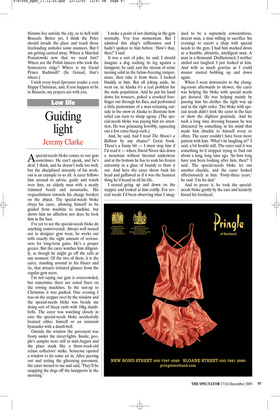Guiding light
Jeremy Clarke
Aspecial-needs bloke comes to our gym sometimes. He can’t speak, and he’s deaf, I think, and he doesn’t walk too well, but the disciplined intensity of his workout is an example to us all. A carer follows him around to advise, guide and watch over him; an elderly man with a neatly trimmed beard and moustache. His respectfulness towards his charge borders on the abject. The special-needs bloke obeys his carer, allowing himself to be guided from machine to machine, but shows him no affection nor does he look him in the face.
I’ve yet to see the special-needs bloke do anything controversial. Always well turned out in designer gym wear, he works out with exactly the right amount of seriousness for long-term gains. He’s a proper geezer. But the carer watches him diligently, as though he might go off the rails at any moment. Of the two of them, it is the carer, standing around in his blazer and tie, that attracts irritated glances from the regular gym users.
I’m not saying our gym is overcrowded, but sometimes there are coxed fours on the rowing machines. In the run-up to Christmas it was packed. One evening I was on the stepper over by the window and the special-needs bloke was beside me doing sets of bicep curls with 10kg dumbbells. The carer was watching closely in case the special-needs bloke accidentally brained either himself or an innocent bystander with a dumb-bell.
Outside the window the pavement was frosty under the street-lights. Inside, people’s armpits were still in mid-August and the place stank like a three-week-old refuse collectors’ strike. Someone opened a window to let some air in. After peering out and noting the glistening pavement, the carer turned to me and said, ‘They’ll be snapping the dogs off the lampposts in the morning.’ I make a point of not chatting in the gym normally. You lose momentum. But I admired this chap’s selflessness and I hadn’t spoken to him before. ‘How’s that, then?’ I said.
It was a sort of joke, he said. I should imagine a dog cocking its leg against a lamppost, he said, and the stream of urine turning solid in the below-freezing temperature, then take it from there. I looked blankly at him. But all joking aside, he went on, in Alaska it’s a real problem for the male population. And he put his hand down his trousers, poked a crooked forefinger out through his flies, and performed a little pantomime of a man urinating outside in the snow in Alaska to illustrate how relief can turn to sharp agony. (The special-needs bloke was paying him no attention. He was grimacing horribly, squeezing out a few extra bicep curls.) And, he said, had I read The Moon’s a Balloon by any chance? Great book. There’s a funny bit — I must stop him if I’d read it — where David Niven skis down a mountain without thermal underwear and at the bottom he has to soak his frozen extremity in a glass of brandy to thaw it out. And here the carer threw back his head and guffawed as if it was the funniest thing he’d heard in all his life.
I ceased going up and down on the stepper and looked at him coldly. For several weeks I’d been observing what I imag ined to be a supremely conscientious, decent man, a man willing to sacrifice his evenings to escort a chap with special needs to the gym. I had him marked down as a humble, altruistic, intelligent man. A man in a thousand. Disillusioned, I neither smiled nor laughed. I just looked at him. And with as much gravitas as I could muster started bobbing up and down again.
When I went downstairs to the changing-room afterwards to shower, the carer was helping the bloke with special needs get dressed. He was helping mainly by passing him his clothes the right way up and in the right order. The bloke with special needs didn’t look the carer in the face or show the slightest gratitude. And he took a long time dressing because he was distracted by something in his mind that made him chuckle to himself every so often. The carer couldn’t have been more patient with him. ‘What’s he laughing at?’ I said, a bit hostile still. The carer said it was something he’d stopped trying to find out about a long, long time ago. ‘So how long have you been looking after him, then?’ I said. The special-needs bloke let out another chuckle, and the carer looked affectionately at him. ‘Forty-three years,’ he said. ‘I’m his dad.’ And to prove it, he took the specialneeds bloke gently by the ears and tenderly kissed his forehead.


















































































 Previous page
Previous page